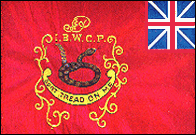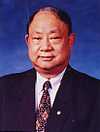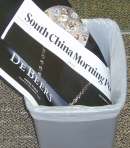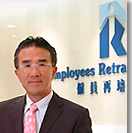


A month ago, the word was that this Friday’s National People’s Congress election would be different from those in the past. Perhaps as many as 100 candidates would run for the 36 seats, introducing more competition into a process that has generally been as rigged as it is irrelevant to most Hong Kong people. Would-be contestants started jockeying for nominations from the 1,200 voters, who mulled over the possible eccentric outcomes to a poll in which every elector has a choice of two or more for each of the 36 votes he must cast. In all the confusion, some of the old dinosaurs who have sat in the NPC for decades might take votes away from young newcomers, to the theoretical benefit of mischievous gatecrashers from – horror of horrors – the pro-democracy camp.
Mindful of the way pro-democrats managed to get one of their own to run against Donald Tsang in the Chief Executive quasi-election a year ago, Beijing’s representatives in Hong Kong resolved to prevent chaos. Not entirely confident that merely circulating their list of preferred candidates would produce the correct result, they picked up the phone and started pressuring the sort of patriots who would understand not to seek nomination, or, failing that, not to file a nomination form – and definitely not to nominate hostile elements with pro-democracy leanings, however moderate, charming or appealing they might be.
And it worked. The 100 or so supposedly thinking of running turned into just 63 who collected nomination forms, of whom only 50 handed them back in to get onto the ballot – including several trouble-making dissident outcasts. This compares with a field of 78 in the last election in 2002.

The Big Boss allows a certain grimness to permeate the atmosphere in the morning meeting, as he ponders the ongoing stock market meltdown. For a brief moment, the S-Meg Holdings senior management team consider the mini-crash as an effect of something bigger and deeper – an imminent sharp downturn in US consumption, meaning lower profits for all sorts of company. Including us. “There are people in America who are making their monthly mortgage payments with their credit cards,” I helpfully point out, to looks of amazement on one or two of the more impressionable faces.
Then we move on to the far more important and interesting matter of the rapid decline of the Hang Seng Index as a cause of various ills. The disease is irrelevant – only the symptoms matter. Our visionary Chairman recites a long list of problems that lie ahead because of shrinking portfolio values, though he can’t resist a smirk when he considers the impact on Hong Kong Exchanges and Clearing senior management’s share options.
To me, it simply means buying opportunities. Last year’s leap in the HSI from around 20,000 to 30,000 was a bubble, partly caused by global excess liquidity, but also the result of our dimwitted bureaucrats trying to talk up the fanciful possibility of selling one board lot of whatever to each of China’s 1.3 billion people. Now we are getting back to realistic valuations.

I wake to hear the radio newsreader inform listeners with great solemnity that someone called Heath Ledger has died. He is presumably a gwailo, and according to the 2006 Population By-census Thematic Report on Ethnic Minorities, there are only 36,384 whites in Hong Kong, so there might be a better than average chance that I am familiar with the name. But, as it happens, I have never heard of him. He was, we are then told, born in 1979. A tragedy, no doubt, but I am still at a loss as to why it is newsworthy. Then it occurs to me – he is probably a soccer player. But, nearing 29, he is surely too old. How about a soccer team manager? Too young, I would guess. A soccer team manager’s son? This could well be it. I vaguely recall the days when managers were anonymous figures who rarely made the headlines. But over the years, as Andy Warhol’s prediction about the eligibility for and duration of fame proved to be a woeful underestimate, greater and greater celebrity has attached itself to these gruff, gum-chewing men with their painful accents, embarrassing neckwear and other manifestations of used-car salesman DNA – to the extent that we are supposed to find their family life fascinating. But no! The newsreader explains that the deceased was an actor who appeared in the film Brokeback Mountain. I am none the wiser. I saw the movie. But it was a pirated edition in Shenzhen. Maybe, instead of the apparently famous Heath Ledger, this substandard DVD featured someone less memorable.
On a more trivial note, the Federal Reserve makes two pretty much unprecedented moves, adjusting interest rates outside its regular review schedule, and slashing them by 75 basis points. The main problem facing markets at the moment is panic, and the root cause of the world’s current economic turmoil is overly low interest rates, so the Fed’s response – panic and cut interest rates – is oddly eloquent and thought-provoking. A stimulating satire of the ills that afflict the contemporary globalized world, cleverly mirroring the obsessions of modern society. Monetary policy’s equivalent of a painting of a Campbell’s soup can, all the better to inspire those of us catching falling knives while trying not to trip over dead cats bouncing off the ground.
Thurs, 24 Jan
The Big Boss will be out of the office tomorrow, voting in the exciting National People’s Congress election before leaving town for a week. As advance punishment for not having him around, members of his dynamic management team are individually subjected to extra time with him today, whether he has anything to discuss with them or not. In my case, he moans about how tiresome the NPC vote will be.
Beijing’s representatives in Hong Kong pressured some eccentric candidates – mostly incumbents – not to run, he tells me. “The mad woman who talks all the time,” was one. “That crazy professor who goes on about UFOs and thinks he’s invented something that will change the nation,” was another. Of the 50 names on the ballot, 10 are outcasts, including some pro-democrats. Beijing’s list of recommended names has 40 people on it – for 36 seats. Although the sifting process has ensured that all the big names will get elected with no problem, there is some extraordinary squabbling going on among the weakest 10 or so approved candidates. Four of them won’t get elected. (In the event of a death among Hong Kong delegates, the candidate ranking 37th gets a seat for the rest of the term, and so on, so there is much to play for, if you like that kind of thing.)
To complicate the issue, the Big Boss explains, the number of votes received by successful contesters is considered to be extremely important. Thus, certain factions, notably pro- and anti-Liberal Party voters, will make a point of not voting for particular ‘big-name’ candidates they hate, in order to reduce their total. The weakest 10 candidates are desperately trying to attract these spare votes, and even the untouchable pro-democrats will pick some up this way – anything to make some of the winners look less popular. I mention the word ‘childish’, and he nods vigorously. “You wouldn’t believe how seriously they take it. Still,” he sighs, “only another 24 hours to go, and all these phone calls will stop.”
Back in the gwailo’s lair, I flick through the news. The Chinese were not the first people to combine archaeology, paleoanthropology, nationalism and racism, but – apart from the odd creationist Klansman – they might be the last. This comes to mind as I read reports of the discovery of a human skull dating back 80,000-100,000 years in Henan. Homo sapiens existed at that time, but any making it to what is now China would have had to be extremely nifty, leaving their nearest and dearest standing in the dust in Africa still languorously wondering about moving north. Most evidence suggests humans settled southern and eastern Asia closer to 40,000 years ago. Creatures plodding around the area on two legs and using tools before then were different, now extinct, species.
Ideologically-driven Chinese scientists have long hankered for a different truth. Perhaps the Chinese are a distinct biological breed, partially descended from some other life form? This means Peking Man. Why anyone would want to claim hairy, brutish Homo erectus lineage is beyond me, but some people have a desperate need to feel different. Still, erectus probably died out over 200,000 years back. So, how about this – the human race started in China and then spread everywhere else, leaving the Sons of the Yellow Emperor, the Seed of the Dragon, at the pinnacle of humanity? It’s a bit of a long shot, but Henan Man, or whatever they want to call it, might bolster the bizarre theory in their own minds, if nowhere else.
Fri, 25 Jan
As one of the mere 17 people who actually pay tax in Hong Kong, I have the nose of a bloodhound when it comes to sniffing out public-sector empire-building. As if the bloated establishment of the Civil Service were not burdensome enough, with its typing pools, car fleets and air-conditioning allowances, the Big Lychee is cursed with what some countries call ‘quasi-non-government’ bodies, or – to use the technical term – parasitical, self-aggrandizing wastes of space. The Trade Development Council, the HK Productivity Council, the Mortgage Corporation, the Applied Science and Technology Institute, the Tourism Board and many more gobble resources, hog limelight, maintain former bureaucrats and spend funds on lavish travel arrangements, excessive health insurance and feng-shui consultation. Most of all, they mysteriously acquire new roles.
They are not hard to spot – simply answer ‘yes’ to three or more of the questions in…
2 Does the body enjoy an ‘independent income’ – eg a tailor-made tax or levy, artificially created business activity or rentals?
3 Does the body compete with private-sector commercial enterprises in any way?
4 Does the body perform activities or produce services that no-one wants?
5 Do the body’s leaders’ comments or actions suggest that they view expansion of the body as more important than execution of the body’s original official duties?
6 Has the body attracted scandal, ridicule or some other avoidable mishap in the last 12 months?
7 Is the body’s logo depressingly bad?
8 Does the body’s Chairman have the family name Tien?
1 Yes, it was intended to migrate middle-aged factory workers into the post-industrial, services-based workforce. Such workers have by now made the transition, retired or got the hint and moved to the Mainland.
2 Yes, a levy on foreign domestic workers – a large, unspent pile of cash.
3 Probably. As a subsidized provider of vocational training, it almost certainly squeezes commercial operators out of the market.
4 Probably. Retraining people still in high school? A random dip into the website shows that it started to offer massage and foot reflexology training courses a couple of years ago. I don’t dare look further.
5 Yes, tone of annual report, etc, shows emphasis on quantity of trainees and courses rather than quality of outcomes.
6 None known. (Well done – jolly good!)
7 Yes.
8 What a stupid question.


stores
Dymocks, IFC Mall
& other HK Dymocks
(some, probably, maybe)
online
Hong Kong & worldwide
USA & worldwide
UK
Canada
Germany
Japan
France
